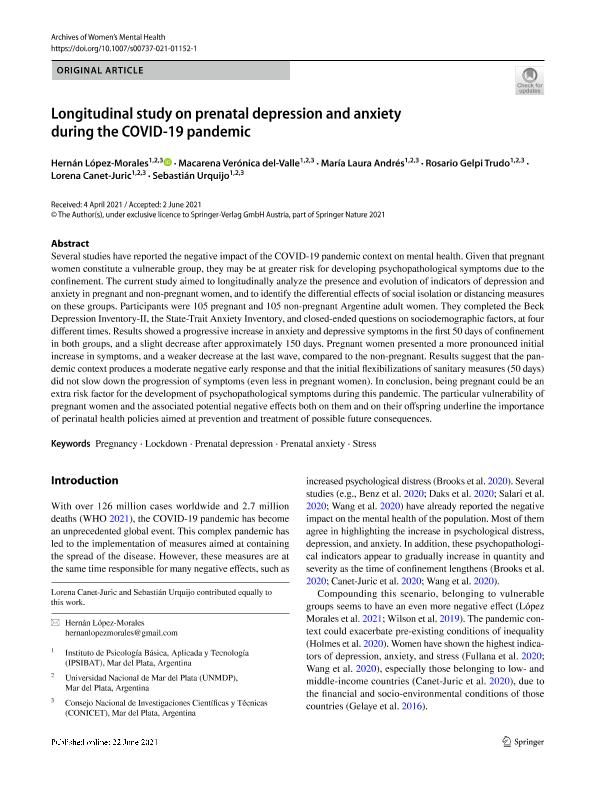Artículo
Longitudinal study on prenatal depression and anxiety during the COVID-19 pandemic
López Morales, Hernán ; del Valle, Macarena Verónica; Andrés, María Laura
; del Valle, Macarena Verónica; Andrés, María Laura ; Gelpi Trudo, Rosario
; Gelpi Trudo, Rosario ; Canet Juric, Lorena
; Canet Juric, Lorena ; Urquijo, Sebastian
; Urquijo, Sebastian
 ; del Valle, Macarena Verónica; Andrés, María Laura
; del Valle, Macarena Verónica; Andrés, María Laura ; Gelpi Trudo, Rosario
; Gelpi Trudo, Rosario ; Canet Juric, Lorena
; Canet Juric, Lorena ; Urquijo, Sebastian
; Urquijo, Sebastian
Fecha de publicación:
06/2021
Editorial:
Springer Wien
Revista:
Archives Of Womens Mental Health
ISSN:
1434-1816
Idioma:
Inglés
Tipo de recurso:
Artículo publicado
Clasificación temática:
Resumen
Several studies have reported the negative impact of the COVID-19 pandemic context on mental health. Given that pregnant women constitute a vulnerable group, they may be at greater risk for developing psychopathological symptoms due to the confinement. The current study aimed to longitudinally analyze the presence and evolution of indicators of depression and anxiety in pregnant and non-pregnant women, and to identify the differential effects of social isolation or distancing measures on these groups. Participants were 105 pregnant and 105 non-pregnant Argentine adult women. They completed the Beck Depression Inventory-II, the State-Trait Anxiety Inventory, and closed-ended questions on sociodemographic factors, at four different times. Results showed a progressive increase in anxiety and depressive symptoms in the first 50 days of confinement in both groups, and a slight decrease after approximately 150 days. Pregnant women presented a more pronounced initial increase in symptoms, and a weaker decrease at the last wave, compared to the non-pregnant. Results suggest that the pandemic context produces a moderate negative early response and that the initial flexibilizations of sanitary measures (50 days) did not slow down the progression of symptoms (even less in pregnant women). In conclusion, being pregnant could be an extra risk factor for the development of psychopathological symptoms during this pandemic. The particular vulnerability of pregnant women and the associated potential negative effects both on them and on their offspring underline the importance of perinatal health policies aimed at prevention and treatment of possible future consequences.
Palabras clave:
LOCKDOWN
,
PREGNANCY
,
PRENATAL ANXIETY
,
PRENATAL DEPRESSION
,
STRESS
,
COVID-19
Archivos asociados
Licencia
Identificadores
Colecciones
Articulos(IPSIBAT)
Articulos de INSTITUTO DE PSICOLOGIA BASICA, APLICADA Y TECNOLOGIA
Articulos de INSTITUTO DE PSICOLOGIA BASICA, APLICADA Y TECNOLOGIA
Citación
López Morales, Hernán; del Valle, Macarena Verónica; Andrés, María Laura; Gelpi Trudo, Rosario; Canet Juric, Lorena; et al.; Longitudinal study on prenatal depression and anxiety during the COVID-19 pandemic; Springer Wien; Archives Of Womens Mental Health; 6-2021; 1-10
Compartir
Altmétricas



